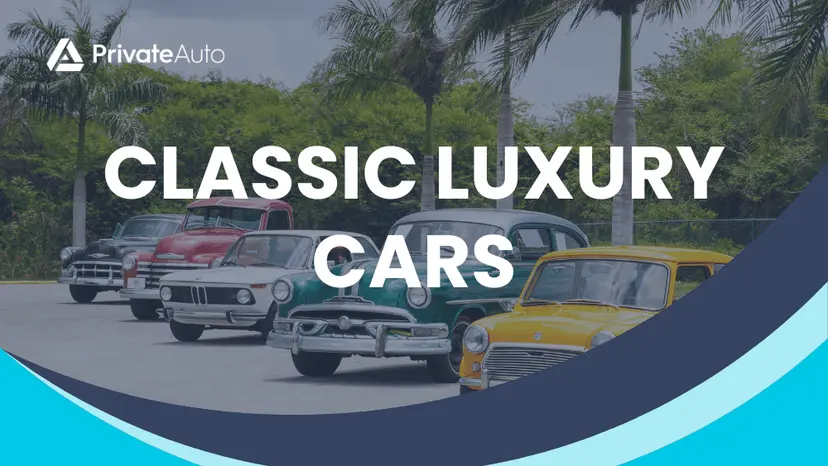
Types of Classic Luxury Cars
Here are the main subcategories of classic luxury cars:
1. Antique luxury cars: these predate the 1920s and were pioneering luxury automobiles showcasing advanced engineering for their time. Prime examples include the 1909 Rolls-Royce Silver Ghost, 1913 Peugeot Bébé, and 1915 Cadillac V-63 Coupe.
2. Vintage luxury cars: built between 1919 and 1930, these vehicles ushered in more refined luxury features and elegant design language. Notable models are the 1925 Hispano-Suiza H6C, 1928 Isotta Fraschini Tipo 8A, and 1929 Duesenberg Model J.
3. Classic luxury cars: spanning the 1930s to 25 years old, this category contains many of the world’s most iconic, prestigious luxury marques at their peak. This includes the 1961 Lincoln Continental, 1963 Mercedes-Benz 600, Aston Martin DB5, and 1989 Bentley Turbo R.
4. Modern classic luxury cars: more recent high-end models that have achieved classical status due to their advanced technology, lavish amenities, and historically significant designs. Examples include the 1990 Lexus LS 400, 2003 Volkswagen Phaeton, and 2005 Maybach 57/62.
While there is some overlap or disagreement about the above categories, they generally hold for most automotive enthusiasts.

Advantages of Classic Luxury Cars
Classic luxury car enthusiasts like to own these vehicles for the following reasons.
1. Nostalgia
2. Uniqueness
3. Value
4. Low insurance costs
5. Quality and elegance
Nostalgia
Uniqueness
Appreciation in Value
Lower Insurance Costs
Insuring a classic car often costs significantly less than insuring a new vehicle.
There are a few key reasons for this:
- Classics are typically not used for daily commutes, so fewer miles driven annually lowers risk. This is why most insurance companies offer discounted ” pleasure use” plans.
- Owners tend to be older and more experienced drivers with good records, representing lower risk. Safe storage also reduces theft and damage risk.
- Limited usage means lower premiums for collision and comprehensive. Most owners select just liability coverage.
- No need for expensive collision avoidance tech and replacement parts coverage.
Quality
Unlike mass-produced models, classic luxury cars showcase artisanal construction methods. Skilled craftsmen meticulously assembled these automotive works of art, with handcrafted elements from the wood veneers to hand-fitted upholstery, using premium materials.
Every surface displays a level of detail and finishing that modern automation cannot replicate. Owning a classic luxury car means possessing the pinnacle of automotive quality and exclusivity that established these marques’ prestigious reputations
Disadvantages of Owning a Classic Luxury Car
A classic car, luxury or not, comes with the following disadvantages.
1. Fuel efficiency: classic cars, luxury ones included, tend to be gas guzzlers.
2. Expensive parts: parts for classic cars—especially for luxury ones—are expensive, as they need to be custom-fabricated or imported from other countries.
3. Rust and corrosion: classic cars, especially those made before the 1980s, are more prone to rust and corrosion.
4. Unreliability: classic cars can be less reliable than modern vehicles due to their age and older technology. Regular maintenance and tune-ups are essential to keep them running well.
5. Comfort and convenience: classic cars lack modern comforts and conveniences, such as air conditioning, power windows, and infotainment systems.
6. Insurance limitations: some insurance policies for classic cars may not cover the car’s actual value or allow daily driving.
7. Limited cargo and passenger space: cars were designed with performance over utility, so cargo capacity and rear passenger room are often limited compared to modern family vehicles.
8. Antiquated safety systems: no airbags, anti-lock brakes, crumple zones, or electronic stability controls.
9. Tricky storage: large dimensions and low profiles make parking and storage more challenging compared to newer luxury cars.
Despite these disadvantages, enthusiasts opt for classic luxury cars because they love them. And we don’t blame them.
What’s the Most Popular Classic Luxury Car?
The following renowned classic cars belong in the luxury class and are universally beloved by enthusiasts.
1. Jaguar MK2 3.8
2. Bentley T1
3. Mercedes-Benz 380
4. Mercedes-Benz 300SL Gullwing
5. Mercedes-Benz 600
6. Aston Martin Lagonda
7. Rolls-Royce Phantom III
8. Bentley Mulsanne
9. Jaguar E-Type
These robust machines are the epitome of high-octane luxury, embodying legendary status.
How to Research Luxury Classic Car Pricing?
Luxury classic cars are difficult to value. You can’t just pop the VIN into our handy car value calculator or the Kelley Blue Book like a mass-model newer car!
Classic luxury cars are worth whatever the market is willing to pay. That’s why most of them are sold via auction.
If you’re a potential buyer, go on auction websites to see what buyers are bidding. You can also talk to dealers who specialize in classic luxury cars to see what they are listing their vehicles for. This research may give you some approximation of what your target vehicle might sell for.
If you’re the seller of a luxury classic car, auction your car yourself with our easy self-serve auction feature and see what buyers are willing to pay. You can set a minimum reserve to protect yourself.
Where is the Best Place to Buy a Classic Luxury Car?
If you’re a classic car enthusiast looking for luxury cars for sale, you have the following options:
1. Buy from an auction website such as Cars and Bids or Hemmings.
2. Buy from a classic car dealer.
3. Buy from a private seller.
We’re big fans of option three: buying from a private party. Historically, doing so has been more of a hassle, but we’ve changed the game. Buy on PrivateAuto with our easy self-serve technology, skip the dealer fees, and get more classic cars for your buck.
From instant payments to secure communications, we give you the power to drive the deal on your terms. That’s why we’re the best place to buy a used classic car online. We have a wide selection of non-classic perfect vehicles for sale as well.
Browse our full selection of vehicles for sale by owner.

Where is the Best Place to Sell My Classic Car?
- Steer clear of car scams with identity verification
- Keep your personal information safe with our secure platform
- Auction your classic car yourself and see what the market is willing to pa
- Act as your escrow service with our escrow-like safeguards
- Get paid instantly with no transfer fees
Even better, you can list your car on other marketplaces. If you find a buyer, you can use our DealNow feature to invite the buyer to a fast-track dealflow that gives you all the advantages of our transactional infrastructure.
Create your listing on PrivateAuto now and see how easy selling your classic can be.
Classic Trucks FAQ
Do classic cars have a future?
Classic cars have a promising future, with enthusiasts and collectors continuing to value these timeless vehicles for their historical significance, design aesthetics, and driving experience. The market for classic cars remains strong, with values ranging from thousands to millions of dollars, showcasing the enduring appeal of these vintage automobiles.
What age group buys luxury cars?
Luxury car buyers tend to be between 45-65 years old—in their career prime earning years but still young enough to crave that upscale status symbol.
Are classic cars good for beginners?
Classic cars are not ideal for beginners. Classics require a lot of maintenance and can have tricky handling for driving novices. Better to start with newer used cars to build experience first.
Are classic cars good for daily driving?
Classic cars can work for daily driving, depending on the specific car and its condition. Some classic cars, such as the Volkswagen Beetle and Ford Mustang, are known for their durability and can be driven daily with proper care.
What makes a car a classic?
What makes a classic car classic is its age (typically 20+ years), design significance, unique engineering, limited production, and collectibility.The lifespan of a truck depends on the type of truck, its usage, maintenance, and driving conditions.
1. Light-duty trucks: average lifespan of 200,000 to 300,000 miles or 10 to 15 years.
2. Medium-duty trucks: average lifespan of 300,000 to 500,000 miles or 12 to 20 years.
3. Heavy-duty trucks: average lifespan of 750,000 to 1,000,000 miles or 15 to 20 years.
What is the difference between vintage cars and classic cars?
Vintage cars are typically defined as vehicles manufactured between 1919 and 1930, while classic cars are generally at least 20 years old and not older than 45 years. These distinctions help enthusiasts, collectors, and regulators categorize and appreciate different types of vehicles based on their age, historical significance, and other factors.